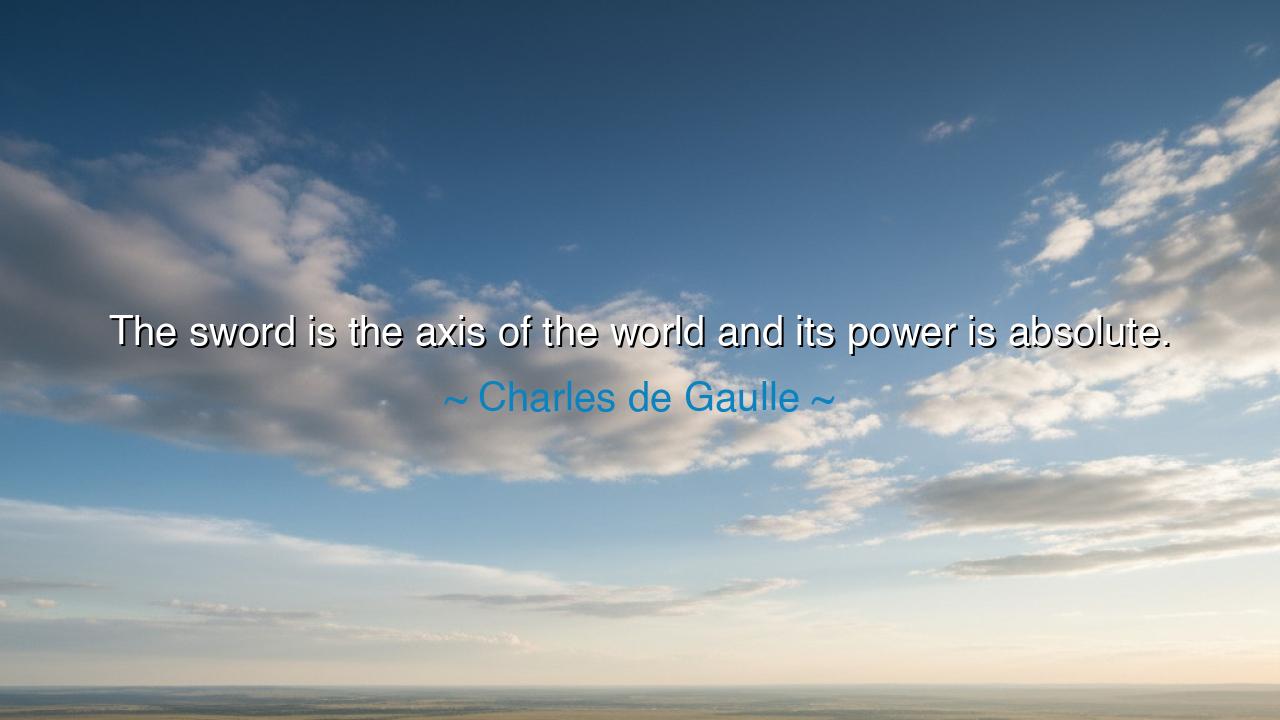
The sword is the axis of the world and its power is absolute.






The words of Charles de Gaulle strike like thunder across the valleys of history: “The sword is the axis of the world and its power is absolute.” In this declaration lies the stern acknowledgment that force, whether for good or for evil, has ever turned the wheels of nations. Though ideals and words inspire, it is the sword—the symbol of military strength and the will to defend—that has often decided the fate of peoples and the balance of the world.
For the axis of the world is that point upon which all turns, the center of motion that determines direction. De Gaulle, who lived through the storms of the twentieth century, knew that lofty principles must stand upon the edge of steel if they are to endure. It was not treaties nor speeches alone that halted tyranny in his age, but the sword wielded by those who dared to resist. Thus, he proclaims that the destiny of nations rests not only on justice, but on the power to defend justice.
History bears witness. When Rome rose from a small city to an empire, it was not by philosophy alone, nor by commerce, but by the sword of her legions. The order of the known world, its laws, its roads, its peace, all rested upon that sharpened edge. Likewise, in more recent memory, it was the sword of resistance—armies, partisans, and nations at war—that brought low the shadow of fascism. Without force, freedom itself would have perished.
Yet, de Gaulle’s words are not only celebration but warning. For the power of the sword, if left ungoverned by virtue, becomes tyranny. The same blade that guards liberty can enslave; the same axis that keeps the world steady can also turn it toward ruin. Thus, his statement reminds us not of blind worship of strength, but of the eternal truth that power must be yoked to justice, lest the axis of the world spin into darkness.
Therefore, let this wisdom endure: words may inspire, ideals may guide, but without the sword to defend them, they wither before the storm. De Gaulle’s cry is a call to courage—that nations and men must be ready not only to dream of freedom, but to fight for it. For the sword, wielded rightly, is not the enemy of peace but its guardian, the axis upon which the world turns toward survival, dignity, and hope.






KTLe Ngoc Khanh Tang
This quote reminds me of how deeply power and survival have been linked throughout human history. De Gaulle, as a military leader, must have understood the sword as a symbol of sovereignty and defense. But I wonder — does believing in absolute power automatically dismiss compassion, diplomacy, or collective peace? Maybe the quote serves as a warning: that even in the pursuit of ideals, humanity still revolves around the reality of strength.
MLTruong Thi Mai Linh
I feel torn reading this — it’s a powerful image, but it also feels outdated in a world where ideas, not weapons, often shape revolutions. Still, maybe de Gaulle was speaking metaphorically about resolve, courage, and leadership — the ‘sword’ as willpower rather than violence. Could it be that the true axis of the world is not force itself, but the determination behind it? That interpretation seems more timeless.
Nnhat
This quote makes me think about the duality of power — creation and destruction intertwined. The sword can defend as much as it can dominate. Was de Gaulle emphasizing necessity rather than aggression? In a way, he might be saying that order in the world depends on the ability to enforce it. But it’s worth asking — if the sword represents power, where do justice and ethics fit into that balance?
BLTran Bao Lien
I find this quote strikingly intense — it speaks to the primal reality of power and conflict that shapes civilizations. Yet I can’t help but question: does de Gaulle’s perspective glorify violence, or merely acknowledge the inevitable role of force in human history? It’s unsettling but also honest. Perhaps the deeper meaning is that authority, whether moral or military, always requires the strength to defend itself.
ATAnh Trang
This statement feels both historical and philosophical. It reflects a worldview where military strength defines global order, which certainly made sense in de Gaulle’s time. But in today’s context, can the ‘sword’ still be considered the axis of the world? With the rise of technology, diplomacy, and economic power, I wonder if influence now lies more in information than in force. Has the nature of ‘absolute power’ evolved beyond physical might?